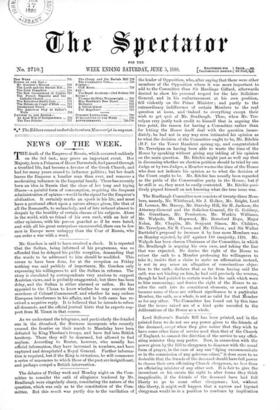The debates of Friday week and Monday night on the
Com- mittee to consider the oath of allegiance tendered by Mr. Bradlangh were singularly sharp, considering the nature of the question, which was only as to the constitution of the Com- mittee. But this result was partly due to the vacillation of
the leader of Opposition, who, after saying that there were other members of the Opposition whom it was more important to add to the Committee than Sir Hardinge C iffard, afterwards desired to show his personal respect for the late Solicitor- General, and in his embarrassment at his own position, fell violently on the Prime Minister ; and partly to the extraordinary indifference of certain Members to the real question at issue, and -indeed to everything except their wish to get quit of Mr. Bradlaugh. Thus, when Mr. Tre- velyan very justly took credit to himself that in arguing the true point, the reason for having a Committee rather than for letting the House itself deal with the question imme- diately, he had not in any way even intimated his opinion as to what the decision of the Committee ought to be, Mr. Ritchie (M.P. for the Tower Hamlets) sprang up, and congratulated Mr. Trevelyan on having been able to waste the time of the House by speaking without giving any inkling of his opinion on the main question. Mr. Ritchie might just as well say that in discussing whether an election petition should be tried by one Judge or by two Judges, a Member wastes the time of the House who does not indicate his opinion as to what the decision of the Court ought to be. Mr. Ritchie has usually been regarded as the pride of the Conservative party in the House; but if he still is so, they must be easily contented. Mr. Ritchie posi- tively piqued himself on not knowing what the true issue was.


































